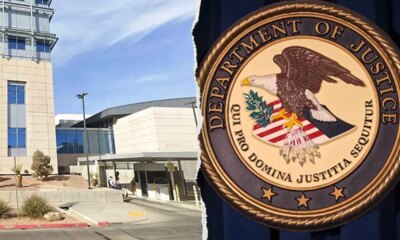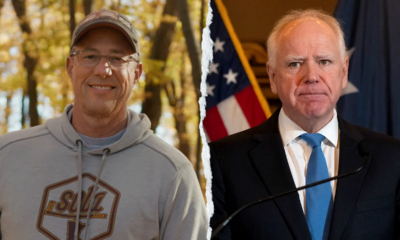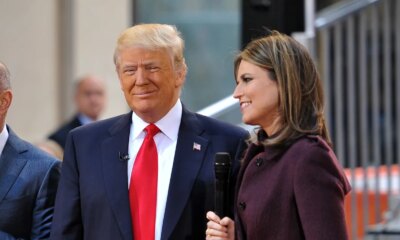Business
What is CrowdStrike, and how did it cripple so many computers?

Talk about irony: The software that paralyzed Windows computers around the world late Thursday night and early Friday morning was planted by a company that protects Windows computers against malware.
That company is CrowdStrike, a publicly traded cybersecurity firm based in Austin, Texas. It acknowledged the problem around 11 p.m. Thursday and started working on a solution, offering a workaround in the wee hours Friday and a fix a few hours later.
The vast sea of Blue Screens of Death triggered by CrowdStrike’s error is a testament to the market-leading status of the company’s software, which detects and defends against malicious code planted by hackers. Its approach is known as “endpoint security” because it installs its defenses on devices that connect to the internet, such as computers and smartphones.
According to the website 6sense.com, CrowdStrike has more than 3,500 customers, which represent about one of every four companies buying endpoint security. Although most of its customers are based in the United States, it has hundreds in India, Europe and Australia, 6sense reports.
Here’s a quick explanation for how things went wrong so quickly for so many Windows users around the world, including airlines, hospitals, banks and government agencies.
The Falcon Sensor update
One of the selling points of CrowdStrike service is that it can improve its defenses rapidly as new threats are discovered. As part of that service, it continuously and automatically updates the Falcon Sensor software on its customers’ machines.
Automatic updates are, under normal circumstances, a good cybersecurity practice because they prevent clients from having machines with outdated defenses on their networks. But the latest incident reveals the flip side of the coin.
According to CrowdStrike, the problem was triggered by a “single content update” for its customers with Windows PCs. The buggy code wasn’t detected until after it had downloaded and installed on many of CrowdStrike’s clients machines.
Once loaded, the bad update interfered with core functions of the PC, causing Microsoft’s infamous blue error screen to pop up and convey a message along the lines of, “Your PC ran into a problem and needs to restart.” And as long as the update remained in place, restarting the machine led to the same errant result.
The fix offered by CrowdStrike
CrowdStrike stopped sending out the faulty update early Friday morning, so machines that had not loaded it yet were spared the turmoil.
For machines caught in the cycle of blue-screen hell, the company initially offered step-by-step instructions for how to reboot Windows in a mode that would allow them to find and delete the buggy update. The drawback, as many commenters online noted, is that this machine-by-machine approach isn’t much help for organizations with hundreds or thousands of bricked PCs.
According to the tech website 404, Microsoft also suggested rebooting a crashed machine multiple times — as many as 15 — could solve the problem.
Within a few hours, CrowdStrike was distributing a piece of software that removed the buggy code. This worked only for customers whose machines were able to connect to the internet and download the fix, though; everyone else would be left with the PC-by-PC workaround.
The lessons from the CrowdStrike debacle
Some Macintosh and Linux users, who were immune to the CrowdStrike-induced upheaval, devoted a portion of their morning Friday to spiking the football on Windows, even though the problem wasn’t caused by Microsoft.
Other observers argued that the incident demonstrated the risk of having one potential point of failure affecting millions of computers — a problem that has been demonstrated repeatedly during the broadband era.
Steve Garrison, founder of Stellar Cyber in San Francisco, said it’s more important to figure out how to make improvements than to play the blame game. This incident, he said, underscores the need for companies to spend plenty of time checking the quality of their products in a controlled environment before releasing them to customers.
Another lesson, he said, is the need for companies, their competitors and their customers to work together as a community to spot problems. “What do we need to do to check the checkers of our supply chain?” he asked.
Dan O’Dowd, a developer of security software for the military, said the fiasco demonstrates that we need better software in critical systems.
“The immense body of software developed using Silicon Valley’s ‘move fast and break things’ culture means that the software our lives depend on is riddled with defects and vulnerabilities,” O’Dowd said in a statement. “Defects in this software can result in a mass failure event even more serious than the one we have seen today.”
He added, “We must convince the CEOs and Boards of Directors of the companies that build the systems our lives depend on to rewrite their software so that it never fails and can’t be hacked. … These companies will not take cybersecurity seriously until the public demands it. And we must demand it now, before a major disaster strikes.”

Business
Disney names theme parks head Josh D’Amaro as new CEO
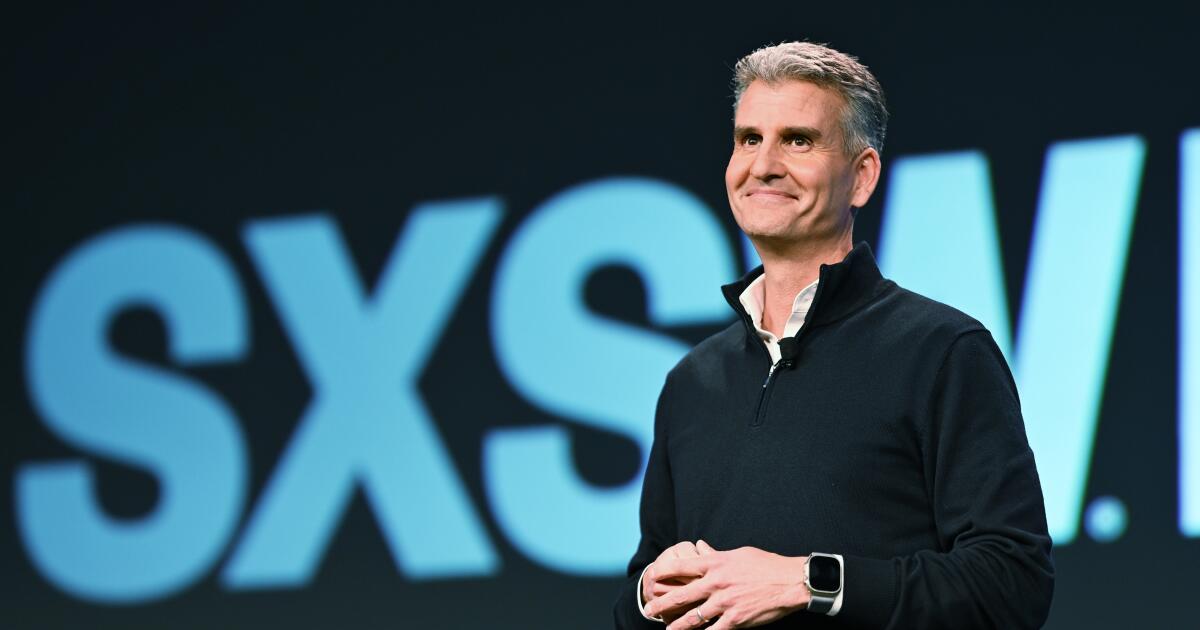
Walt Disney Co. selected theme parks chief Josh D’Amaro to be the company’s next chief executive, culminating the most closely watched succession drama in Hollywood.
D’Amaro, who has run the company’s pivotal parks and experiences division for six years, will be charged with steering the Burbank entertainment giant through increasingly turbulent times.
He officially becomes chief executive at the company’s March 18 shareholder meeting — replacing Chief Executive Bob Iger, who will hand over the reins after two decades in the top job revitalizing the company.
Iger will stay on as a senior advisor and board member until his retirement from the company when his contract expires in December.
Dana Walden, co-chair of Disney Entertainment, was named the company’s president and chief creative officer, becoming the first woman to serve as president at the 102-year-old company. She will report to D’Amaro.
“Josh D’Amaro is an exceptional leader and the right person to become our next CEO,” Iger said in a statement. “He has an instinctive appreciation of the Disney brand, and a deep understanding of what resonates with our audiences, paired with the rigor and attention to detail required to deliver some of our most ambitious projects.”
D’Amaro, who turns 55 this month, is respected on Wall Street and has long been a favorite among legions of Disney superfans who view him as a charismatic cheerleader for Mickey Mouse, Buzz Lightyear and other inhabitants of the Magic Kingdom.
Within Disney, D’Amaro is known for his consensus-building style, his mastery of Disney’s distinct culture and for safeguarding its beloved brands.
D’Amaro, a native of Massachusetts, joined Disney 28 years ago in Anaheim’s Disneyland accounting department and will become the ninth person to lead the company. He steadily rose through the ranks, working in finance, business strategy and marketing and eventually leading Disneyland and then the larger Disney World Resort in Florida.
A big promotion came in early 2020 when he was entrusted with all of the company’s theme parks, cruise lines and its creative cadre of Imagineers.
His portfolio includes video games and consumer products. He’s overseen numerous high-profile construction projects, including Star Wars: Galaxy’s Edge and the Marvel-themed Avengers Campus at Disneyland as well as the current $60-billion expansion of cruise lines and theme parks, which includes plans for a new venture in Abu Dhabi.
In a statement, Disney’s board noted that D’Amaro currently leads Disney’s largest division, which produced $36 billion in the last fiscal year.
He will oversee all of Disney and its workforce of 230,000 as the entertainment colossus tries to soar in the streaming age amid the erosion of the company’s once-mighty legacy cable TV business and a punishing theatrical business climate.
He also must balance the promise of artificial intelligence without allowing it to destroy the value of Disney’s characters and movie franchises. A further challenge is to help Disney navigate the nation’s divisive political landscape.
Succession planning stretched more than two years.
“All of the directors became very comfortable with Josh’s skills, aptitude and readiness,” Disney board Chair James Gorman said in an interview. “Readiness was key, and that’s why we moved at this time. We were ready, Bob was ready to step aside, and he felt like Josh was ready as well as Dana and the whole team.”
Disney noted the board, in a meeting Monday, unanimously selected D’Amaro as CEO.
“D’Amaro’s most immediate priorities will be managing the Parks business through what continues to be a bumpy economic environment, particularly for non-wealthy consumers,” TD Cowen media analyst Doug Creutz wrote in a research report. He will also be tasked with “maintaining creative momentum in the Studios, both at the box office and on Disney+.”
While D’Amaro “lacks experience on the creative side of the business,” Creutz wrote, the promotion of Walden, who is respected in Hollywood, should fill that gap.
“It will however be critical for the two executives to be able to forge a strong partnership,” Creutz said.
Gorman, in the interview, said having a chief creative officer is new for Disney (Iger has largely filled that role without the title). The elevation expands Walden’s purview over Disney’s movie studios and all streaming service content.
“Dana is a strong leader. She’s decisive. She’s got great creative chops and she’s worked well with Alan Bergman as co-chair of entertainment,” Gorman said. “The idea is to ensure we bring creativity to all parts of the company in all corners of the world.”
After Disney’s March meeting, D’Amaro will join the company’s board.
His pay package will be about $38.5 million, consisting of a $2.5-million base salary, a $26.3-million long-term incentive each fiscal year subject to adjustment for performance or economic conditions and a one-time long-term incentive award of $9.7 million. He’s also eligible for an annual performance-based bonus worth 250% of his base pay, which could work out to about $6.3 million.
“Throughout this search process, Josh has demonstrated a strong vision for the company’s future and a deep understanding of the creative spirit that makes Disney unique in an ever-changing marketplace,” Gorman said. “The Board believes he is exceptionally well prepared to guide this global company forward to serve our consumers around the world and create long-term value for shareholders.”
Disney shares recovered slightly from an earlier slump Tuesday, closing at $104.22. Investors had been rooting for D’Amaro to succeed Iger. He bested three other senior executives for the job: Walden; movie studio head Alan Bergman; and ESPN Chair Jimmy Pitaro.
Bergman and Pitaro will continue in their “critical leadership roles” and work with D’Amaro and Walden, the company said Tuesday.
D’Amaro’s elevation comes six years after Disney’s disastrous CEO handoff to then-parks chief Bob Chapek, who was D’Amaro’s boss for many years. Chapek was sacked after less than three years in the job — a chaotic period marked by COVID-19 pandemic closures and battles with Florida Gov. Ron DeSantis, actor Scarlett Johansson and senior Disney executives.
Iger returned in November 2022 to quell concerns among investors and Disney staff. He has spent the last three years putting the Mouse House back in order, cutting costs with thousands of layoffs and planning for Disney’s future. The changes included transitioning ESPN into a stand-alone streaming app, laying the groundwork for the parks expansion, making a $1.5-billion investment in “Fortnite” developer Epic Games to bolster Disney’s video games and preparing for this week’s long-anticipated succession.
“We have done a lot of fixing, but we’ve also put in place a number of opportunities … to essentially expand at every location that we do business and on the high seas,” Iger said on a Monday earnings call with Wall Street analysts.
CEO of Disney Bob Iger arrives for a conference in 2023 in Sun Valley, Idaho.
(Kevin Dietsch / Getty Images)
Succession has been a top priority for Disney’s board since Gorman, former chair and chief executive of investment bank Morgan Stanley, took over in early 2025 as chair of Disney’s board.
Seeking to avoid another blunder, board members formalized the succession planning, establishing a committee led by Gorman, who instituted a more rigorous evaluation. Gorman and other committee members spent time with the CEO candidates to learn their strengths, weaknesses and visions for the future.
The board’s succession committee comprised Gorman, General Motors CEO Mary Barra, Lululemon Athletica CEO Calvin McDonald and Sir Jeremy Darroch, the former head of Sky broadcasting in Britain.
Iger spent hours mentoring the various candidates, including during Disney’s crisis last September when ABC briefly suspended late-night comedian Jimmy Kimmel over remarks in the wake of conservative activist Charlie Kirk’s killing.
Iger helped navigate the conflict amid outrage from political conservatives, President Trump and the chair of the Federal Communications Commission. On the other side, free-speech advocates were furious that Disney appeared to be ready to cut ties with Kimmel to appease the Trump administration.
Instead, Kimmel extended his stay through May 2027.
For D’Amaro, part of the challenge will be living up to the standards set by Iger, who helped the company prosper during his long career.
“Iger was really the visionary deal maker and the global brand quarterback,” said Bill Campbell, head of research for Paragon Intel in Connecticut. “D’Amaro is really the builder-operator who can protect the magic and make the machine more predictable.”
But Iger himself noted that D’Amaro would have to chart a new path.
“In the world that changes as much as it does, in some form or another trying to preserve the status quo is a mistake,” he said in the Monday earnings call. “I’m certain that my successor will not do that.”
Business
‘Melania’ director Brett Ratner turns up in Epstein files, again
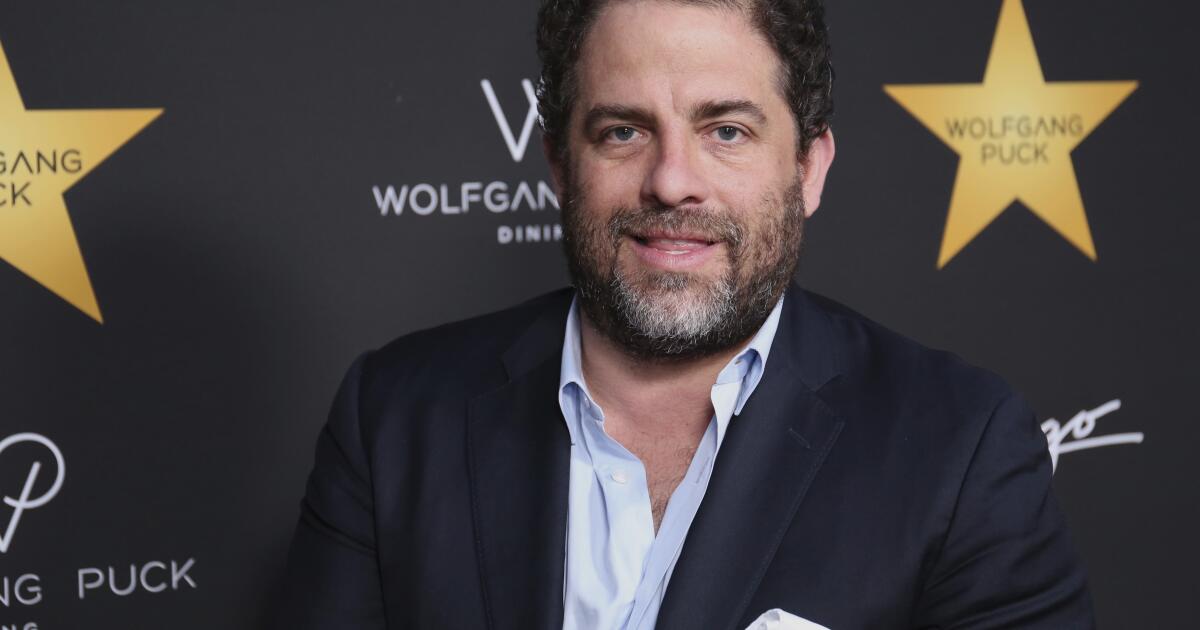
Controversial director Brett Ratner, whose documentary “Melania,” about the first lady, premiered last week, found himself in the headlines once again over his alleged ties to Jeffrey Epstein.
A photograph, part of the trove of files released Friday in the Department of Justice’s investigation into Epstein, shows Ratner sitting on a couch with his arms wrapped around a woman, whose identity is concealed. She is sitting next to Epstein and a second woman, who is also redacted in the photo and is sitting at the far end of the couch next to the disgraced financier. It is unclear where the photo was taken or when.
The filmmaker is among several prominent individuals from the worlds of entertainment, technology, politics and business — including L.A. Olympics boss Casey Wasserman — who have turned up among the millions of files that the Justice Department has released.
Epstein died by suicide in 2019 in Manhattan Correctional Center while awaiting trial on sex trafficking charges.
Ratner’s name also surfaces in a number of emails contained in the released files in which Epstein discusses his attempts to connect with the director and descriptions in which their social circles overlap.
It is not the first time Ratner turned up in Epstein’s orbit. In December, his photo appeared in an earlier batch of files the department released.
In the undated photograph, Ratner is seen seated, hugging a shirtless Jean-Luc Brunel, a French modeling agent and an Epstein associate.
Brunel died of an apparent suicide in 2022 in a French prison while awaiting trial on charges that he had raped a minor.
Ratner has not been accused of any wrongdoing in connection with Epstein.
A spokesperson for the director did not immediately respond to a request for comment.
During a Monday appearance on “Piers Morgan Uncensored,” Ratner said that the recently released photograph was taken about 20 years ago. He said that the woman he is hugging was his then-fiancée, whom he declined to name, and that she had invited him to an event where the picture was taken.
“I’ve never been in contact with Jeffrey Epstein before that photo and never in contact with him after,” he said on the show.
Among the emails in which Ratner is mentioned, in December 2010, Epstein discusses a dinner he is having at “7:30” in which he says that he has invited Ratner but has not yet heard back.
In December 2010, it was widely reported that Epstein hosted a dinner at his Manhattan townhouse just months after he finished serving a prison sentence and house arrest for soliciting a minor for prostitution. The dinner was attended by a number of boldfaced names including Woody Allen and Andrew Mountbatten-Windsor, formerly Prince Andrew.
A year later, Epstein’s assistant appears to email Ratner saying, “Jeffrey would like to speak with you regarding [redacted] could you please give us a call.” It is unclear whether Ratner followed up.
In another heavily redacted email from 2018, Epstein writes to someone saying: “Hi I’m Jeffrey. brett Ratner thought we should meet.” He follows up with a second email asking whether Ratner had spoken to this person yet.
During the Cannes film festival in 2012, celebrity superpublicist and ubiquitous presence on the awards circuit Peggy Siegal emailed Epstein that she was sitting with Ratner about to watch a Roman Polanski documentary, adding that “Brett says ‘hi’ and he loves you!”
In other gossipy emails Siegal sent to Epstein, she cites Ratner in her listing of which power brokers and celebrities are in attendance at various parties and who is staying on whose yacht in St. Barts (Ratner, she wrote, was staying with his business partner, the Australian billionaire James Packer).
Siegal’s relationship with the convicted pedophile came under renewed scrutiny in 2019 after Epstein was arrested on sex trafficking charges, particularly as she helped facilitate his return to society following his prison sentence.
“Had I known that he had been accused of abusing underage girls, I would not have maintained a friendship with him,” she told the Hollywood Reporter.
Siegal could not be immediately reached for comment.
On Nov. 1, 2017 — the day The Times published its investigation in which six women accused Ratner of sexual misconduct — Epstein emailed lawyer Reid Weingarten: “brett ratner now oy.”
Ratner’s career was derailed nine years ago after The Times published detailed allegations against the director made by multiple women who accused him of harassment, groping and forced oral sex. Actor Olivia Munn claimed that Ratner masturbated in front of her when she delivered a meal to his trailer on the set of the 2004 film “After the Sunset.”
At the time, the director’s attorney Martin Singer rejected the women’s claims, saying that his client “vehemently denies the outrageous derogatory allegations that have been reported about him.”
Ratner’s agents at WME dropped him, as did his publicist, and projects were put on hold. Ratner parted ways with Warner Bros.
“I don’t want to have any possible negative impact to the studio until these personal issues are resolved,” he said in a statement.
In 2020, Ratner became embroiled in another Hollywood sex scandal, involving British actor Charlotte Kirk.
In a sworn court declaration, Kirk said she was victimized by then-Warner Bros. Chief Executive Kevin Tsujihara, Ratner, Packer and Millennium Films CEO Avi Lerner, stating that the men “coerced me into engaging in ‘commercial sex’ for them and their business associates.”
Singer, who represented the men, “categorically and vehemently” denied any wrongdoing on the part of his clients.
“Melania” is the first film Ratner has directed since he was largely exiled from Hollywood. The documentary has received harsh reviews from critics, who have also questioned the $75 million Amazon paid to distribute and market the movie. However, during its opening weekend, it grossed a better-than-expected $7.1 million at the box office.
Business
California’s Teamsters call for Waymo ban, saying driverless cars threaten safety and jobs

The Teamsters of California is calling for the suspension of Waymo’s operations in the state amid growing safety and job security concerns.
The union, which has 250,000 members across dozens of industries, called on the California Public Utilities Commission on Monday to indefinitely suspend the driverless car company’s license to operate. The demand comes less than two weeks after a Waymo self-driving taxi struck a child near a Santa Monica elementary school, triggering a National Highway Traffic Safety Administration investigation.
In a statement, Teamsters California co-chairs Peter Finn and Victor Mineros called the incident a “horrifying wake-up call for California policymakers who have repeatedly ignored the growing list of red flags concerning robotaxis.”
The child, who ran out from behind a large SUV to cross the street, wasn’t injured in the collision. The Waymo had been traveling at 17 miles per hour before the child appeared and reduced its speed to 6 miles per hour before contact was made.
“We are committed to improving road safety, both for our riders and all those with whom we share the road,” Waymo said in a statement last week about the accident. “Our peer-reviewed model shows that a fully attentive human driver in this same situation would have made contact with the pedestrian at approximately 14 mph.”
Waymo has been the subject of previous NHTSA investigations and recalls following collisions. In December, motionless Waymo vehicles clogged San Francisco streets after a power outage.
“Imagine a scenario where more and more of these vehicles are on the street and there’s an earthquake,” said Finn of Teamsters California in an interview. “There’s people trying to evacuate, there’s emergency response, and these things can’t move at all.”
Waymo also poses a threat to Californians who depend on driving jobs for their livelihood, Finn said. As the race to master autonomous vehicle technology heats up, the union is concerned that companies will eliminate human jobs to lower labor costs.
A statewide poll conducted last year by Teamsters California found that more than 80% of respondents were concerned about the impact of AI and automation on job availability.
“This incident is emblematic of the broader goal Big Tech companies have to replace skilled human labor with AI … and force our communities to reckon with the fallout of automation’s shortcomings,” the Teamsters’ statement said.
Kodiak AI, a Mountain View-based tech company, is developing autonomous semi trucks it says will improve safety and efficiency on the roads. Tesla is also working on its robotaxi technology, and Elon Musk has shared ambitions for self-driving cargo trucks.
Teamsters California is leading a legislative effort to require a human operator to be present in autonomous commercial delivery vehicles at all times.
Autonomous trucks could be a safety hazard and could eliminate thousands of jobs, the union said. Driving jobs are among the most common jobs.
“The stakes get even higher when we’re talking about trucks and delivery vehicles,” Finn said. “It feels like the regulators, in this case CPUC and the Department of Motor Vehicles, should have to do more to get a handle on this.”
-

 Indiana2 days ago
Indiana2 days ago13-year-old rider dies following incident at northwest Indiana BMX park
-

 Massachusetts3 days ago
Massachusetts3 days agoTV star fisherman, crew all presumed dead after boat sinks off Massachusetts coast
-

 Tennessee4 days ago
Tennessee4 days agoUPDATE: Ohio woman charged in shooting death of West TN deputy
-

 Pennsylvania1 week ago
Pennsylvania1 week agoRare ‘avalanche’ blocks Pennsylvania road during major snowstorm
-

 Movie Reviews1 week ago
Movie Reviews1 week agoVikram Prabhu’s Sirai Telugu Dubbed OTT Movie Review and Rating
-

 Indiana2 days ago
Indiana2 days ago13-year-old boy dies in BMX accident, officials, Steel Wheels BMX says
-

 Culture1 week ago
Culture1 week agoTry This Quiz on Oscar-Winning Adaptations of Popular Books
-
Austin, TX5 days ago
TEA is on board with almost all of Austin ISD’s turnaround plans



